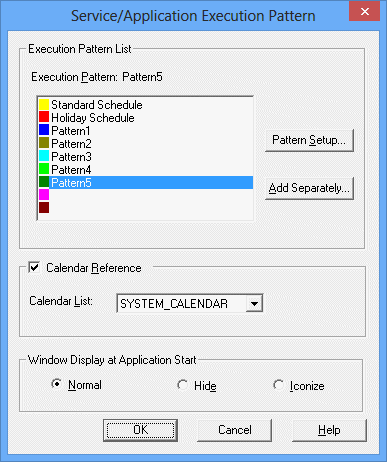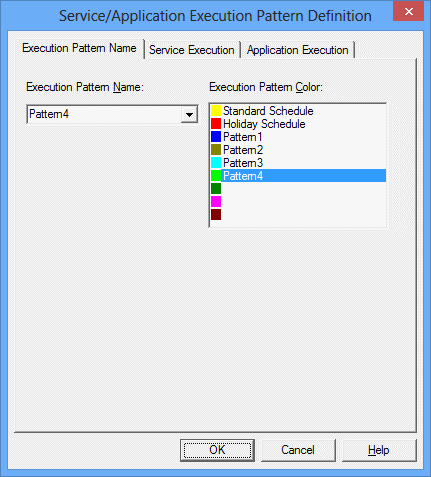To operate the server in a pattern that does not apply to either the standard schedule or the holiday schedule, it is necessary to register a user-specific definition pattern. Select a pattern other than Standard Schedule or Holiday Schedule from the Service/Application Execution Pattern dialog box, then use the Service Execution sheet or the Application Execution sheet (only the Application Execution sheet for UNIX system) of the Service/Application Execution Pattern Definition dialog box to register a user-specific definition pattern.
The following describes how to register a user-specific definition pattern for services and applications.
Procedure
Displaying the Service/Application Execution Pattern dialog box
Select Service/Application Execution from the Job Selection window of the Systemwalker Operation Manager window. Then, select Service/Application Execution Pattern from the Options menu.
Figure 10.8 Service/Application Execution Pattern dialog box

Displays the currently-selected execution pattern names (Standard Schedule/Holiday Schedule/User-specific definition patterns (up to seven)).
Displays the Service/Application Execution Pattern Definition dialog box.
Displays the Service/Application Execution Pattern Definition dialog box.
Check this option to use the calendar.
Displays the list of calendars registered.
Specifies the display method (normal display, no display or icon display) when starting up the application.
Displaying the Service/Application Execution Pattern Definition dialog box
Select a pattern other than the Standard Schedule or the Holiday Schedule in the Service/Application Execution Pattern dialog box, then click Pattern Setup.
Figure 10.9 Service/Application Execution Pattern Definition dialog box - Execution Pattern Name sheet

Specifies the service/application execution pattern name.
Setting the user-specific definition pattern
Make the following settings using the Service Execution sheet or the Application Execution sheet of the Service/Application Execution Pattern Definition dialog box.
Service Execution sheet [Windows version]
Specifies the service name, the preceding service name, the parameter and operation when the preceding service has not been executed.
Application Execution sheet
Specifies the execution file name, parameter and execution directory.
Saving the user-specific definition pattern
Click OK in the Service/Application Execution Pattern Definition dialog box. The newly-registered user-specific definition pattern name will be added to the Execution Pattern List in the Service/Application Execution Pattern Definition dialog box. Up to seven patterns can be registered as the user-specific definition patterns.
Selecting the day to change from the standard schedule or the holiday schedule to the user-specific definition pattern
Carry out one of the following operations in the Service/Application Execution window to select the date to apply the pattern.
Selecting a day of week
Clicking a day (of week) section selects all the dates of that day (of week).
Selecting a date
Select using one of the following methods.
Clicking a date section selects the button. Clicking again cancels the selection.
Clicking date sections while pressing down the Shift key selects the range from the previously-selected date to the clicked date.
Clicking date sections while pressing down the Ctrl key selects the clicked date in addition to the previously-selected date.
Changing to the user-specific definition pattern
Select a registered user-specific pattern from the pop-up menu displayed by right-clicking on the Service/Application Execution window.
The service/application execution pattern will be applied to the selected dates. By carrying out these operations in the same way, it is possible to change patterns to apply among the standard schedule, the holiday schedule and the user-specified schedule.
Note
The applied schedule can be temporarily disabled. Select the desired dates, then select Disable Schedule from the pop-up menu displayed by right-clicking. This disables the schedule on all the selected days, and no service or application is started.